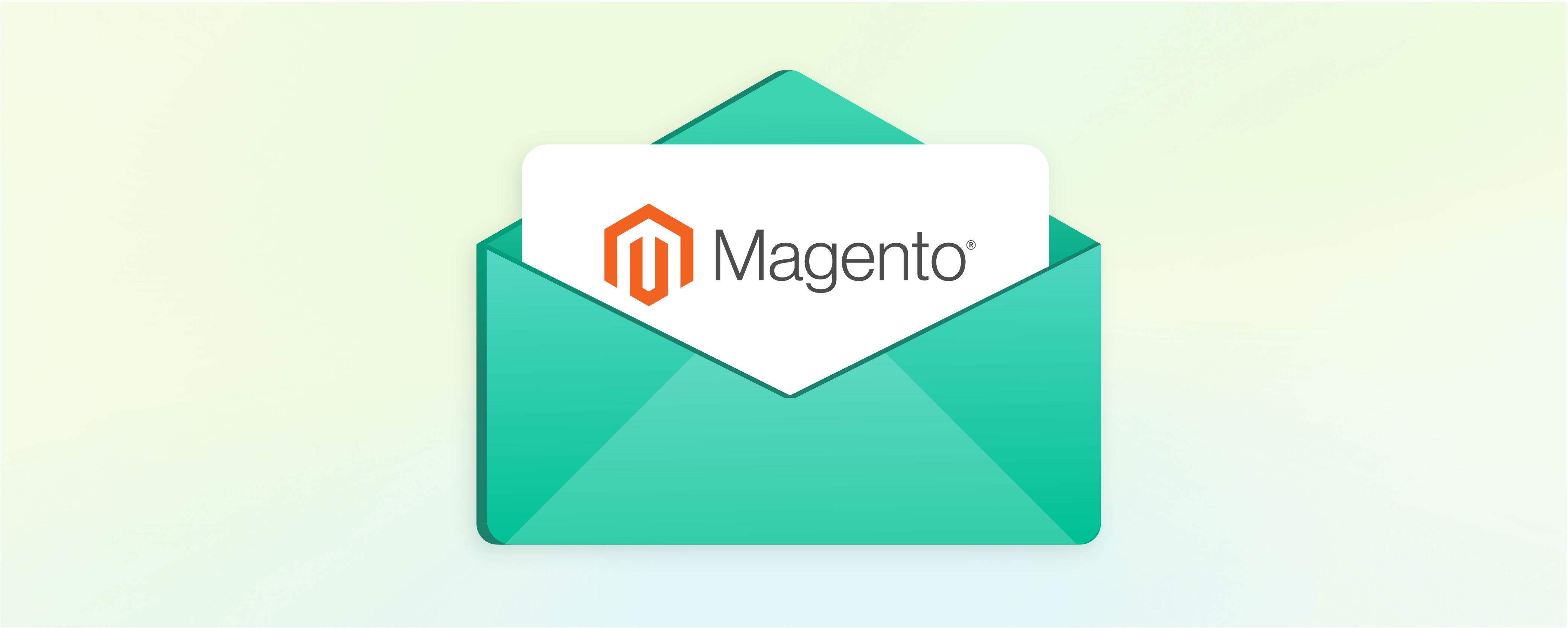
Steps to Implement Effective Email Marketing Magento Strategies
Email marketing Magento strategies significantly benefit ecommerce stores by providing a powerful tool for engaging customers and driving sales. These strategies enable precise segmentation, personalized messaging, and efficient automation. It helps enhance customer retention, boost Magento conversions, and maximize the ROI of marketing efforts. This article will explore the steps required to implement email marketing strategies for ecommerce stores. It will guide you on how to harness the full potential of email marketing to facilitate the growth of your online business.
Key Takeaways
-
Learn about email marketing in Magento and the importance of email marketing for e-commerce growth.
-
Discover 8 steps to implement email marketing in your Magento ecommerce store.
-
Explore the effectiveness of segmentation in email campaigns to target specific audiences and increase engagement.
-
Understand the importance of setting clear objectives for your email campaigns and conversion rate.
-
Learn how list automation streamlines communication by automatically sending welcome emails, birthday greetings, and newsletters.
-
Discover essential steps to ensure your Magento store is prepared to handle increased website traffic generated by successful email marketing campaigns.
Overview of Email Marketing in Magento
Email marketing in Magento 2 platform is a dynamic approach to reaching customers and prospects through email communications. It involves the strategic use of email to convey messages, promotions, and updates to a targeted audience. This method capitalizes on Magento's features and capabilities, allowing businesses to tailor their email campaigns with precision and automation.
Email marketing in Magento includes list management, segmentation, content creation, and delivery scheduling. It fosters customer relationships, increases sales, and measures the effectiveness of its email campaigns through key performance metrics. Successful utilization of email marketing in Magento can significantly contribute to the growth and success of an online store.
The Significance of Email Marketing for Magento Stores
Email marketing plays a pivotal role in the success of Magento stores. Several key factors include:
-
Facilitating Customer Engagement: Email marketing enables direct customer communication, facilitating personalized interactions tailored to their interests and needs. This personalized approach enhances customer engagement.
-
Driving Conversions: Well-structured email campaigns have the potential to yield higher Magento conversion rates. It is because they reach a precisely targeted audience genuinely interested in the products or services offered.
-
Cost-Effective Reach: Unlike many other marketing channels, email marketing provides a cost-effective means to reach a wide customer base, especially when automated. It minimizes the expenses associated with traditional marketing methods.
-
Boosting Customer Retention: By consistently updating customers about new products, promotions, and updates, email marketing contributes to customer retention efforts. It keeps existing customers informed and engaged.
-
Facilitating Upselling Opportunities: Email marketing also aids in upselling by recommending Magento products to existing customers. It results in an increased average transaction value.
-
Providing Data-Driven Insights: Email marketing generates valuable customer behavior, preferences, and engagement metrics data. This data-driven approach empowers businesses to make informed decisions and refine their Magento marketing strategies.
-
Cultivating Brand Loyalty: Consistent and relevant email communication builds trust and fosters brand loyalty among your customer base. It reinforces your brand's presence in customers' minds.
-
Driving Increased Sales Revenue: Email marketing can significantly increase sales revenue. Consequently, it is an indispensable tool for revenue generation in the ecommerce landscape.
Implementing Effective Email Marketing Strategies in Magento
1. Customer Segmentation

Customers have diverse motivations for engaging with your business. Email marketing allows targeting each individual based on their specific reasons. Before crafting your email campaign, identify your primary objectives:
- Acquiring new clients
- Re-engaging with previous customers
- Rewarding loyal customers with Magento promotional offers
Tailoring your emails to these objectives necessitates careful targeting. To optimize the effectiveness of your email campaigns, consider segmenting your customer base.
Segmentation involves categorizing your email list into distinct groups based on relevant criteria. Examples of segmentation include:
- A general sales list for a brand with all shoppers
- A segmented list for a decoration brand, targeting business owners with emails about corporate gifts
- Separate lists for men and women for an apparel retailer to send gender-specific collection updates
- A list of loyal customers for a shoe retailer to distribute exclusive coupons
By employing segmentation, your ecommerce business can:
-
Save time by avoiding excessive emails to the entire list
-
Increase Magento sales potential by directing emails to segments more likely to engage
-
Build customer trust by sending relevant emails without overwhelming the list with unnecessary messages.
Segmentation also helps you avoid sending too many emails to your entire email list, which can lead to customer fatigue and unsubscribes.
2. Defining Your Email Goals

Every email campaign must have a clear objective, and the same applies to email marketing within the Magento platform. To determine the success of your email campaign, it's essential to establish specific goals. Key metrics to consider include:
- Open rate: The percentage of subscribers who open your emails.
- Click-through rate: The number of subscribers who click on links within your emails.
- Conversion rate: The percentage of subscribers who purchase from your email.
- Unsubscribe rate: The number of individuals who opt out of your email list.
Regardless of your prioritized metrics, you must comprehend the campaign's objectives. Before crafting your Magento email content, clearly understand what you intend to achieve and how to execute it effectively. It involves:
- Ensuring the message in your email is concise and clear so that recipients can quickly go through it.
- Creating a compelling call to action that captures your customers' attention.
3. Implementing List Automation

Email marketing can become repetitive, particularly when new email signups happen daily, necessitating daily welcome emails. List automation involves creating an automated email list using predefined Magento email templates. This system sends emails automatically, ensuring timely communication with new clients as they sign up.
Automation facilitates the immediate dispatch of welcome emails to new clients without manual intervention. Additionally, it enables the organization of these email addresses by channeling them into a general list for further categorization.
This tactic proves effective for various types of emails, including:
-
Welcome emails: Automation ensures new subscribers receive a warm welcome promptly.
-
Birthday greetings: Automated messages can be scheduled to celebrate your customers' special days.
-
Newsletter: Automation streamlines the delivery of regular updates to your audience.
4. Optimizing Your Website for Increased Traffic

Email marketing campaigns often increase Magento website traffic, creating an opportunity for your Magento store to convert visitors into actual customers. This influx of visitors and potential sales is undeniably beneficial. However, ensuring that your website is adequately prepared to handle the expected traffic is crucial.
A primary consideration is to verify the security of your site. This measure instills confidence in your customers that their personal information will remain secure during transactions and reduces the risk of cyberattacks. Several critical steps can be taken to enhance your Magento’s store's security:
-
Upgrade to the Latest Magento Version: Staying current with the latest version of Magento ensures access to the most up-to-date security features and patches.
-
Maintain SSL Certificates: Regularly check and update your Magento SSL certificates to guarantee secure data transmission and safeguard customer information.
-
Monitor Website Activities: Monitor all website activities to detect and address any potential security threats or anomalies promptly.
5. Tailoring Campaigns for Every Occasion

Ensure you have a well-thought-out email campaign ready for each occasion. Beyond the widely recognized retail events like Black Friday and Valentine's Day, numerous other occasions warrant email communication with your customers.
These occasions may include birthdays, minor holidays, and company anniversary sales.
Producing an email campaign for each suitable occasion carries several key advantages:
-
Increased Chance of Sales: Having targeted campaigns for specific occasions increases the likelihood of generating sales, as customers are more inclined to make purchases related to the event.
-
Maintaining Visibility: Consistently sending relevant emails keeps your brand visible in your customer's inbox, reinforcing brand presence and customer engagement.
-
Enhancing Brand Recall: Regularly reaching out to customers on special occasions enhances brand recall and fosters a sense of connection with your brand.
-
Leveraging Minor Holidays: Utilizing minor holidays as opportunities for store promotions can boost sales and customer engagement.
6. Avoid Overwhelming Your Subscribers

While keeping your customers consistently updated about your brand can be tempting, a successful Magento email marketing campaign is to avoid sending excessive emails.
Sending too many emails can be counterproductive to increasing conversions. Rather, send periodic updates, ideally limiting your email frequency to once a week or less.
This approach helps balance staying engaged with your customers and respecting their inboxes. Ensure your messages are welcomed and not perceived as spam email. You can sustain meaningful engagement with your audience by adhering to a measured email frequency.
Additional considerations include:
-
Monitoring Engagement: Keep a close watch on open and click-through rates, and adjust your email frequency based on subscriber engagement levels.
-
Opt-Out Option: Provide a clear and easy option, allowing subscribers to manage their email preferences and unsubscribe when desired.
-
A/B Testing: Experiment with different email frequencies to identify the optimal sending time that resonates best with your audience.
7. Magento 2 Extensions

Magento 2 extensions are powerful tools to enhance your email marketing capabilities, particularly in sending follow-up and abandoned cart emails. Here's how Magento 2 extensions can aid your campaign:
-
Follow-Up Emails: Magento 2 extensions automate follow-up emails, allowing you to engage customers after specific interactions or events. For instance, you can send follow-up emails after a customer's first purchase, encouraging them to explore more products or leave a review. This personalized approach fosters customer loyalty and can lead to repeat business.
-
Abandoned Cart Emails: One of the most effective strategies for recovering potential lost sales is through abandoned cart emails. Magento 2 extensions can automatically trigger emails to customers who have abandoned Magento shopping carts. It reminds them of their pending purchases and encourages them to complete the transaction.
8. Employ a Marketing Automation Tool

Consider integrating a marketing automation tool within your Magento email marketing strategy. These tools offer significant advantages by automating various email types, including:
-
Transactional Emails: Automate the delivery of transactional emails, ensuring essential customer interactions. It includes Magento order confirmation emails and shipping notifications, which are prompt and accurate.
-
Review Request Emails: Solicit customer feedback effortlessly by automating review request emails after a purchase, enhancing your store's reputation and product insights.
-
Abandoned Cart Emails: Reduce cart abandonment rates by automatically sending reminder emails to customers who abandon their shopping carts. It entices them to complete their purchases.
-
Welcome Emails: Create a positive first impression by automating welcome emails to new subscribers or customers. It includes introducing them to your brand and offering exclusive incentives.
-
Up-sell and Cross-sell Emails: Boost revenue by automating up-sell and cross-sell emails, recommending complementary products to customers based on their purchase history.
-
Win-back Emails: Re-engage inactive customers through automated win-back emails, encouraging them to return to your store with enticing offers or incentives.
Optimizing Your Magento Server for Email Marketing
Enhancing the performance of your Magento server for email marketing enables faster email delivery and keeps your customers satisfied. Here's a concise guide on how to achieve this:
-
Upgrade to the Latest Magento Version: Stay current by upgrading to the latest version of Magento, benefiting from new features and bug fixes that enhance performance.
-
Choose a Competent Hosting Service: Select a Magento hosting service well-versed in Magento, as they can optimize your server settings to boost site speed and reliability.
-
Utilize a Dedicated IP Address: Set up a dedicated Magento IP address for sending emails, preventing your emails from being flagged as spam.
-
Ensure Server Settings Match Magento Requirements: Confirm that your server settings align with Magento's specifications, including adequate memory and the correct time zone configuration.
-
Regularly Clean Logs and Unnecessary Data: Free up server space and optimize performance by periodically cleaning out old logs and redundant data.
-
Implement Email Handling Extensions: Install extensions such as SendInBlue or Moosend to manage large email lists efficiently without encountering issues.
-
Maintain Database Health: Regularly inspect your database for errors or Magento performance-hindering elements to keep it in optimal condition.
-
Configure Cron Jobs Correctly: Ensure that Magento cron jobs are correctly configured to facilitate the timely dispatch of automated emails.
-
Optimize Email Images: Compress Magento images within emails to ensure speedy loading, accommodating customers with slower internet connections.
FAQs
1. What role does personalization play in enhancing email marketing strategies?
Personalization in email marketing enables tailored communication to specific audiences based on their preferences and behavior. Merchants can significantly improve engagement and conversions by incorporating personalized subject lines, content, and offers.
2. How crucial is analytics in evaluating the effectiveness of an email marketing campaign?
Analytics play a pivotal role in measuring the success of an email marketing strategy. Marketers can track metrics like open rates, click-through rates, and conversion rates to gauge the campaign's performance and make informed decisions for optimization.
3. How can merchants effectively reduce cart abandonment rates through email marketing?
Utilizing email strategies like abandoned cart emails can help reduce cart abandonment rates. Sending timely and personalized reminders to customers who left items in their carts can encourage them to complete their purchases.
4. What are the key benefits of integrating email marketing tools with Magento for merchants?
Integrating Magento email marketing tools allows marketers to streamline their email campaigns. This integration facilitates efficient management of audiences. It helps create personalized email templates and enhances deliverability, contributing to a more effective email strategy.
5. How can email templates and a drag-and-drop editor contribute to better email campaigns?
Email templates and drag-and-drop editors simplify the creation of visually appealing and responsive emails. Marketers can design engaging content without coding knowledge, ensuring consistency in design and increasing the impact of Magento newsletters and promotional emails.
Summary
Email Marketing for Magento focuses on leveraging email strategies within the Magento platform to enhance customer engagement and drive sales. This article delves into the significance of email marketing for Magento stores and the steps to implement effective email marketing for your ecommerce. Explore optimal Magento server hosting solutions to ensure seamless performance and efficient email marketing operations for your online store.


